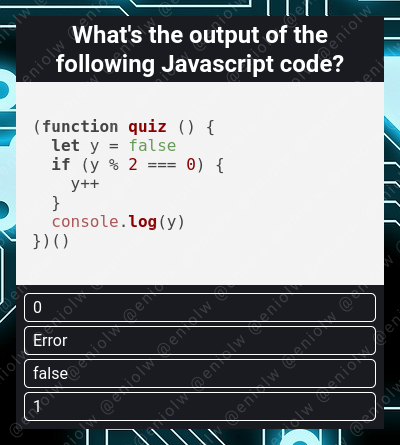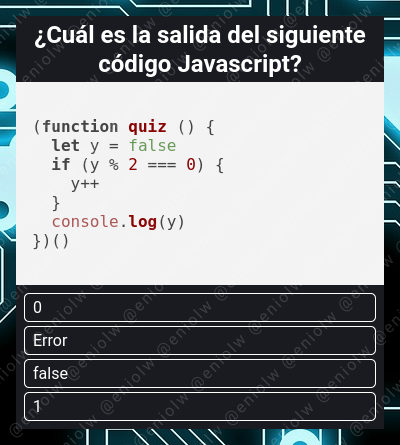My Coding Quiz #11 👨💻🛠️🧩
Welcome to the new installment of my series of Coding Quizzes, in which you will be able to test your knowledge and skills about programming and software development in a simple and fun way. If you want to learn more about it visit my blog here on Hive and the first post where I introduced it.
Without further ado, here's the riddle...

By @eniolw
What's your choice?
Solution to the previous quiz: ab ['A', 'B', 'C']. Line 1 creates a variable m with a string 'abc'. Line 2 creates an anonymous string based on m, but with uppercase characters: 'ABC'.
With this string, in turn, a list n is created where each element of the list consists of each character of the given string. The content of the n list would be ['A', 'B', 'C']. Python can create lists like this in many ways and here it does it with the * as an unpacking operator (yes, once again, the * has yet another distinctive use in Python).
Line 3 has the rest of the quiz gist: The : operator applied to a list or string in this way is used to do slicing. First the string m is sliced from the beginning to exclusive position 2, i.e. only indices 0 and 1 will be extracted, resulting in the value 'ab'.
Then the n list is sliced from the beginning to exclusive position 4. This list is not that big, since its length is 3, but Python is made to do slicing safely, that is, it will only slice up to the actual limit of the list, even if a larger value is specified for it. This will prevent overflow or similar errors. Therefore, what is printed in line 3 is ab ['A', 'B', 'C'].
How did you like it? What was the essence of the quiz for you? Probably the unpacking operator and the slicing operator. But this is not all that these operators can offer. @splash-of-angs63 solved this quiz. Great!
If you want to blog about computer science and programming content, I invite you to join Hive and participate in its communities, such as STEM-social, Develop Spanish, Programming & Dev, Hive Learners and others.
Mi Quiz de Programación #11 👨💻🛠️🧩
Bienvenido a mi nueva serie de Quizzes de Programación, en la cual podrás poner a prueba tus conocimientos y habilidades sobre programación y desarrollo de software de una manera sencilla y divertida. Si quieres aprender más sobre ella visita mi blog aquí en Hive y el primer post donde la presenté.
Sin más preámbulos, he aquí el acertijo...

Por @eniolw
¿Cuál es tu elección?
Solución al quiz anterior: ab ['A', 'B', 'C']. La línea 1 crea una variable m con una cadena de caracteres 'abc'. La línea 2 crea una cadena anónima basada en m, pero con caracteres en mayúsculas: 'ABC'.
Con esta cadena, a su vez, se crea una lista n donde cada elemento de la lista está formado por cada caracter de la cadena dada. El contenido de la lista n sería ['A', 'B', 'C']. Python puede crear listas como estas de muchas maneras y aquí lo hace con el * como un operador de desempacado (sí, una vez más, el * tiene otro uso distintivo más en Python).
La línea 3 posee el resto de la esencia del quiz: El operador : aplicado a una lista o cadena de esta manera sirve para hacer rebanado. Primero se rebana la cadena m desde el principio hasta la posición 2 no exclusiva, es decir, que solo se extraerán los índices 0 y 1, lo que se traduce en el valor 'ab'.
Luego se rebana la lista n desde el principio hasta la posición 4 no exclusiva. Esta lista no es tan grande, pues su longitud es de 3, pero Python está hecho para hacer el rebanado de manera segura, es decir, que solo rebanará hasta el límite real de la lista, aún cuando se le haya especificado un valor mayor. Esto prevendrá errores de desbordamiento o similares. Por tanto, lo impreso en la línea 3 es ab ['A', 'B', 'C'].
¿Qué te ha parecido? ¿Cuál fue la esencia del quiz para ti? Probablemente el operador de desempaquetado y el operador de rebanado. Pero esto no es todo lo que estos operadores pueden ofrecer. @splash-of-angs63 resolvió este quiz. ¡Qué bien!
Si quieres bloguear sobre contenido informático y de programación, te invito a unirte a Hive y participar en sus comunidades, tales como STEM-social, Develop Spanish, Programming & Dev, Hive Learners y otras.
